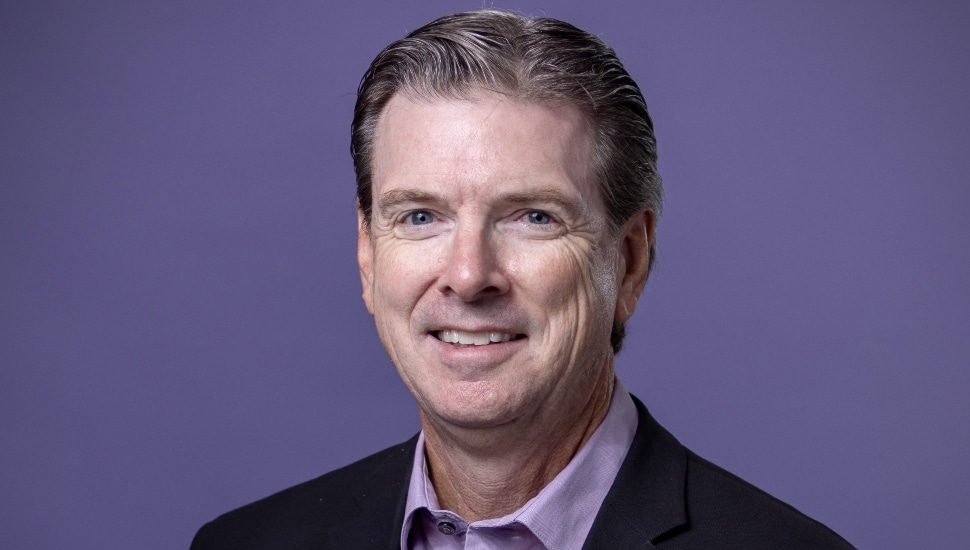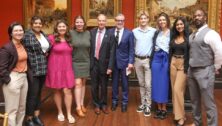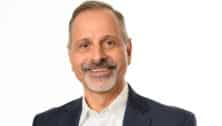Chester County Leadership: Gary Golden, CEO, Propell Credit Union

Gary Golden, CEO of Propell Credit Union, spoke with VISTA Today about growing up in Michigan and West Chester. He recalled idyllic memories of playing outside all day long in the summer and playing football, baseball, and basketball until an injury cut his college football career short.
Golden described juggling work, college, and starting a young family. He found his way to a career in banking because of the convenient, stable hours and stayed with it for 40 years. He discussed Propell Credit Union’s expansion into Chester County and why the credit union has no drive-throughs at its branches.
Where were you born and where did you grow up?
I was born the youngest of three children and the only boy in Broomall, Delaware County. I moved around when I was a child because of my father’s job, so I spent some time in Michigan, but I spent my formative years in West Chester. We moved to West Chester when I was in middle school.
Being the youngest and the only boy, were you spoiled?
By the time they got to me, I think my parents had pretty much given up. They were more interested in doing their own thing. They had a big circle of friends. When I was in high school, I’d be out on a Saturday night, get in late, and I’d still beat them home.
What did your dad do that caused you to move around so much? And what did your mom do?
He worked for Ford Motor Company. At some point in your career there, you’ve got to spend time in the home office. That’s what took us to Michigan. My mom was a homemaker.
What do you remember about growing up in Michigan or West Chester?
It was a long time ago now. Things were a lot different. I often wonder if my grandchildren will have the same types of experiences that I had. In the summer, you’d be outside from early morning, and you weren’t home until it was dark. That doesn’t happen today. I think they might be missing something.
Did you work when you were growing up?
In high school, I worked for a pool company in the summer. That was not a bad job, but it was a lot of hard work. I also worked for a plastic manufacturing company, as a fabricator. Whatever was available in the summer to give me some spending money, that’s what I did.
Did you play any sports?
Whatever was in season. Growing up, all my friends played sports — football, baseball, basketball. I went to college to play football. But a back injury cut that first year short, and that was the end of that.
What sport were you best at?
Probably baseball. I played middle infield, shortstop, or second base. I liked football more, but I wasn’t really built for it.
What kind of music floated your boat when you were in high school?
I had a pretty diverse taste in music. I was in high school in the late ’70s, and early ’80s, so I was certainly a follower of ’70s rock, but I was also a big fan of jazz like Miles Davis, Lee Morgan, and more contemporaries like George Benson. I listened to that even more so than the traditional music of the day. I’m also pretty sure in high school, I was the only kid that had a tape of Frank Sinatra in his car.
Where did you end up going to college, and why there?
I started at Hofstra on Long Island. But I went there for the sole purpose of playing sports, and when that didn’t work out, I came back and took some classes in West Chester. But then I decided, “I need to go get a job and make some money.” Within a year, I stopped going to school, got a job, got married, and started a family.
It was a wake-up call. Your life changes when family happens, and you’ve got more responsibility. Things become real. I realized, “Maybe I shouldn’t have left school so quickly.” So I finished my schooling at Widener University and did graduate work there.
Why Widener?
Convenience. It was local. I was going at night because I had a full-time job and a job on the weekends to make ends meet, so I was going up to three nights a week, so it had to be somewhere that I could get to after work.
What job were you working during the day?
That’s how I got into banking: My first job was at a car dealership, doing F&I and truck sales. But I realized I couldn’t do that and go to school at the same time because of the hours. One of the owners of the dealership connected me with one of his banker friends at Delaware Trust in Wilmington. Not only was it 9:00 AM-5:00 PM, but they had a tuition reimbursement program. Forty years later, I’m still in banking.
Who were the people who saw promise in you, that saw your work ethic and drive, Gary?
I started with Delaware Trust but ended up working for a small community bank in Media called Elmwood Federal Savings Bank. Over the next 12 years, I never left the company, but throughout the ’90s and the early 2000s, it was acquired five times and there were a lot of bank mergers. That gave me a lot of exposure to a lot of different people and different influences.
Ultimately, the end acquirer of that group was M&T Bank. So, I went from a small community bank to a super regional without ever leaving. That was a great organization. But by that point, I was living in north Wilmington and working in Horsham, so it was a long drive.
I got a call from a recruiter who said, “Hey, I have this opportunity for you.” I said, “No, I’m happy with where I am.” And he’s like, “It’s 10 minutes from your house.” So, I took a job with ING Direct. I was one of the earlier Americans who joined here in Wilmington. ING Direct ultimately got to be a substantial size throughout the country before they were bought by Capital One.
Why do you think you kept going up and up as the banks merged?
I learned early on how to relate to people and how to deal with people. I got along with pretty much everybody. Understanding people is more important than anything else. I always say, “I’m a dumb banker. You have to explain this to me.” I don’t know too much, but what I’ve learned over time is if you understand people and you can get along and be honest with them, for the most part (some people will take advantage of your good nature) you’re going to do okay. Be authentic, be yourself, and let things fall where they may.
You also brought a deep work ethic to the table.
I started early. My wife and I were young parents. I worked a full-time job, I worked a part-time job on the weekends, and went to school two or three nights a week. My wife worked full-time and had the kids. I never thought of it any other way.
You put in a lot of hours to get good at banking.
Well, you have to. But I viewed all of that as an investment in myself because despite always working in banking and for someone else, I have a bit of an entrepreneurial spirit.
The advice that I like to give to younger people when they ask about career advice is always to keep a little entrepreneurial spirit. You work for yourself first. Think of yourself as a personal services corporation renting yourself out to whoever makes the best deal for you.
That doesn’t mean you’re not loyal or not committed to your organization but take pride in your career. If you’re asked to do something extra or take on more responsibility, view that as an opportunity to expand your skillset, expand your utility. It’s an investment in yourself.
How did you get to BHCU?
I knew my predecessor, Phil Travaglini, the previous CEO. We had worked together at Elmwood and stayed in touch even after we went our separate ways. I had often thought we might do things together but never had the opportunity. He was a little older than I was and thinking about retiring.
When Capital One acquired ING, I knew I had had enough of corporate banking. I was never comfortable with it because it didn’t go with the people approach that I mentioned earlier. It was time for a lifestyle change, too, because by this time I was traveling a lot.
As I said, Phil was the former CEO and thought I might be a good fit here. I met with the board, and we talked about what the future would look like because I wasn’t interested in just managing something. That was boring to me. I said, “If you’re just looking for someone to keep it afloat, I’m probably not your guy. But if you want to grow, you want to expand, then we should talk about that. Because here’s what I think we can do.”
Here you are, halfway through 2024. What are you focused on? What are your priorities?
We have a lot going on! We’re opening up a new office in West Chester this month, so we’re excited about that. BHCU has been a community credit union since 2015. Before that, it was called a SEG credit union or a select employment group credit union where you had to be an employee or a family member of the Boeing Company. We converted that to a community charter, which meant anybody in Delaware County — if you worked, worshipped, or went to school in Delaware County — you could join.
At the end of last year, we expanded and moved into Chester County, so now our field of membership is Delaware and Chester counties. West Chester is our first office in Chester County, but there will be more.
It was time for a better identity because, for BHCU, people in Chester County may not realize or care what the history was. We’ve been around for 72 years, but the next 72 years probably won’t look like the last 72 years. We developed a rebrand, and BHCU transitioned to Propell Credit Union on Sept. 1.
How do you want Propell to be known in that space?
First off, I don’t want to be known as a banker. All the banks say the same thing: “We’re about relationships, not transactions.” For the most part, they don’t walk the talk.
We are very people-focused, and again, this goes back to my personality. We truly exist for relationships. We don’t even have any drive-throughs. Because what is a drive-through? It’s a transaction. If I just told you, “I don’t do transactions, I do relationships,” but then I give you a bunch of transaction opportunities, I’m a hypocrite. We walk the walk.
Our business model is a little bit different. A lot of banks are forcing it more online and self-service. Yes, we have the same slick apps for those that need self-service. You don’t have to come in to see us; you can do everything online. We’ve got to give that option, but you’re not going to experience our full value proposition if you just use our online portals exclusively.
So, we’re opening more branches. We want to be in the communities that we serve. We want to get to know them, and we want them to know us on a personal level. People often say, “It’s just business.” Financial services is not just business. It’s very personal to the people that you’re talking to.
We also focus on small businesses because Delaware County and Chester County are hotbeds for small businesses, with tons of contractors, tradesmen, and mom-and-pop shops. That’s the community that we serve, and they tend to be ignored by the larger banks. So there’s plenty of space for us.
What do you do with all your free time, Gary?
In the not-too-distant past, it was about my children, a girl and two boys. They’re all adults now, but they were very active in sports, so it was all about them. Now, I’m the proud grandfather of five grandchildren.
My older two grandchildren are also now very active in their school sports. We lost a little bit of that when our kids turned into adults, but now we get to keep it going with our grandchildren. We spend a lot of time looking after them. There’s nothing else we’d rather be doing.
Three last questions for you. What’s something big you’ve changed your mind about, Gary, over the last 10 years?
That it doesn’t always have to be my way. I used to be a bit stiffer and less patient. I’m at the top of our pyramid here. The buck stops with me, and I understand the responsibility and what goes with that. But it’s easy to get into the mindset of, “We’re doing it this way. That’s it because I get to decide right now.”
Now, I’ve learned I can tolerate more chaos and more friction. It’s okay to rely on the team and let other people be just as successful. As I said earlier, I’m not the smartest guy. But as a manager, and then ultimately as an executive or leader, the one big lesson I learned, and the way to be most successful, is to surround yourself with good people, get out of the way, and let them do their job. A rising tide raises all boats, and you’ll be fine if you take care of your team.
It’s a crazy world out there. How do you stay hopeful and optimistic?
I’m grounded with family and relationships. It’s a small organization that I’m in now, so it’s a pretty tight group. We have a nice culture, and we take painstaking steps to keep it that way. I interview every single candidate for every position that we have because we want to keep it tight and have the right mix of people.
So, surround yourself with the right people. Don’t sweat the small stuff. Stay focused on what you can control. Take care of one another. The rest of the stuff is just noise.
Finally, Gary, what’s the best advice you’ve ever received?
I’ve been fortunate to work with a lot of great people and for some great people, and you take a little bit of everybody with you. The most recent was before I came to the credit union, the CEO of ING, Arkadi Kuhlmann, had said, “On your leadership journey, remember it’s not about you. It’s about the mission. So have a purpose. You can lead people, and they will follow you if they understand there’s a purpose behind what they do and that you’re on a mission together. Make it about the mission, not about you.”
I learned a lot from him and the people who worked for him because he was also one who surrounded himself with some of the best talent I had ever been exposed to.
Connect With Your Community
Subscribe to stay informed!
"*" indicates required fields


![95000-1023_ACJ_BannerAd[1]](https://vista.today/wp-content/uploads/2023/03/95000-1023_ACJ_BannerAd1.jpg)

















































